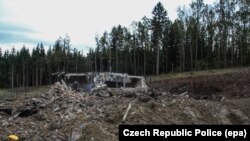On April 17, Czech authorities announced the expulsion of 18 Russian diplomats identified as spies, giving them 48 hours to leave the country. This followed the revelation that two operatives working for Russia’s GRU (military intelligence) were likely involved in two explosions at ammunition storage facilities near the Czech town of Vrbetice in 2014, killing two.
The biggest reveal, however, was that two suspects involved in the operation, Anatoly Chepiga and Alexander Mishkin, were alleged GRU operatives. In 2018, these same two individuals were identified as the prime suspects in the Salisbury, England poisoning case, in which one person was killed and three others hospitalized after being exposed to the chemical agent Novichok. The target of that attempted assassination was Sergei Skripal, a former Russian military intelligence officer who had become a double agent.
Chepiga and Mishkin had traveled in the U.K. under the assumed names of Ruslan Boshirov and Alexander Petrov. After British authorities revealed their photos, the two managed to contact the editor-in-chief of RT (Russia Today), Margarita Simonyan, who interviewed them on TV. Their true identities were later revealed in an extensive investigation conducted by the open-source intelligence outlet Bellingcat and Russian journalists.
In response to Czech authorities’ revelations about the GRU’s role in the 2014 explosions, Russian officials, including the Russian Foreign Ministry spokeswoman Maria Zakharova, denied any involvement. On April 21, however, Simonyan, took a different line on her personal Twitter account. She tweeted:
“What is the Czech Republic trying to tell us? That in their private warehouse, without looking, criminals kept weapons in volumes capable of providing for a long-term civil war in an average European state. And they, the Czechs, did nothing about this.”
She followed up with:
“And then Boshirov and Petrov came and blew up this warehouse to dog cockroaches. And the average European state can now sleep peacefully. Well, if so, then I am proud to meet these brave guys, knights of world peace and law and order.”
Simonyan’s tweets appear to contradict the Russian official denials. And the idea that the GRU operatives had foiled a criminal operation is false.
Simonyan referred to the two men as Boshirov and Petrov, the names they gave when she interviewed them after the Salisbury poisonings. It has long since been revealed their real names are Mishkin and Chepiga.
In the case of the 2014 explosions, it was found that the same two men had traveled to Czechia under different false identities and were in the country at the time of the ammunition depot explosions. According to Czech authorities, they had requested access to one of the ammo depots posing as arms purchasers working on behalf of Tajikistan.
Russia’s intelligence services have no authority to destroy things in Czechia, and there is nothing to suggest the ammunition facilities were illegal. There has been speculation that the ammo belonged to EMCO, a company owned by a Bulgarian national, Emelian Gebrev, and that it was intended for sale to Ukraine. Both explosions occurred after the start of the Russia-Ukraine conflict in the Donbas region in spring 2014.
Viktor Yahun, former deputy head of the Security Service of Ukraine, claimed that in 2014 the Ukrainian government had sought to purchase ammunition from Bulgaria, but EMCO released a statement denying that it had reached an agreement to ship ammunition or arms to Ukraine, or any other country, in 2014. The company also said it would cooperate with Czech authorities in their investigation of the blasts.
In 2015, Gebrev was hospitalized after suddenly falling severely ill at a restaurant In the Bulgarian capital of Sofia. Subsequent investigations pointed to Russia’s GRU, with investigators determining that an operative smeared a toxic substance on the door handle of one of Gebrev’s cars.
That method of delivery was similar to the one used in the 2018 poisoning of Skripal and his daughter Yulia, when the nerve agent Novichok was smeared on the doorknob of their home in Salisbury. In January 2020, Bulgaria’s prosecutor general office said it would charge three Russians in the attack on Gebrev, but months later the case was suspended without explanation.
In response to Czechia’s April 17 expulsion of its diplomats, Russia ordered the expulsion of 20 diplomats from the Czech Embassy in Moscow. In response, Czechia warned it would continue to expel Russian diplomats unless its own diplomats were allowed to return to Moscow.
On April 21, the Council of the European Union released a statement expressing solidarity with Czechia (also known as the Czech Republic) and condemning Russia’s involvement in the 2014 explosions.
“The European Union strongly condemns the illegal activities on the territory of the Czech Republic that caused the explosions at the Vrbetice ammunition depot in 2014,” the statement read, noting that the explosions killed two Czech citizens.
“The European Union is deeply concerned by any gross violation of international law and sovereignty of the Czech Republic, as well as any such action targeting any other EU Member State. Russia must desist from activities that threaten security and stability in Europe and run counter to Russia’s international obligations.”
